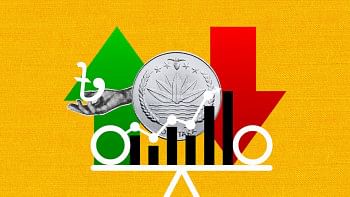Food Grains From Local Sources: Govt to buy less despite low stock

In a surprising move, the government has reduced the internal procurement target of food grains for the coming year, even though it had reached its lowest just two months ago in the current year.
It has also failed to control food prices, especially that of rice – a staple in every Bangali household.
Experts believe the government did not put enough thought on wellbeing of poor and marginal farmers -- the community that has been producing food for the people during the pandemic.
For the upcoming fiscal, the government set the procurement target at 20.44 lakh metric tons, while it was 25.06 lakh metric tons for the ongoing 2020-21, according to the food account.
"The government will take all possible measures to achieve the target and ensure food security," Finance Minister Mustafa Kamal said in his budget speech.
He, however, did not elaborate on how the government would attract farmers and millers to sell their produce to its food depots.
The internal food procurement was a massive failure last year, resulting in a hike in rice prices.
In the last budget, the government targeted to procure 25.06 lakh metric tons of food grains from the internal market for the current year.
It could, however, only procure 14.04 lakh metric tons. At one stage, the stock of rice in government food depots came down to 3.10 lakh metric tons.
After failing to procure rice from the local market, the government did not have enough food grain stock to manipulate the food market and control prices, which caused a significant hike in food prices, experts said.
An internal report of the agricultural ministry showed the price of rice increased from Tk 13 to Tk 14.
The government's procurement drive is currently ongoing.
Starting from April 28 and May 7, the government so far procured 1.16 lakh metric tons of paddy and only 2.65 lakh metric tons of rice and 63 thousand metric tons of wheat under the current procurement scheme.
In his speech, the minister said the capacity of food storage has increased over the years.
Since coming to the power in 2009, the government set a target to increase the food grain storage capacity at the government level to 27 lakh metric tonnes. So far, the government has a storage capacity of 21 lakh metric tonnes.
LOW INCREASE OF FOOD BUDGET
In the proposed budget, the government has just increased only Tk 266 crore for agriculture, food security, fisheries and livestock for the next fiscal. The ministry-wise allocation of the ministry of food has decreased to Tk 5,310 crore from Tk 6,814 crore.
When asked about the reduction of allocation, Dr Mosammat Nazmanara Khanum, secretary to the ministry of food, said, "Maybe the overall allocation for the food sector has reduced but allocation for procurement and distribution of food has increased."
Mohammed Asadaduzzaman, former director, Bangladesh Institute of Development BIDS said the government did not treat the agriculture, food and fisheries and livestock sector with priority, as they increased only Tk 266 crore for this sector.
The government allocated a total of Tk 24,948 crore for agriculture, food security and fisheries and livestock in the next fiscal year. The allocation for the current fiscal was Tk 24,682.
He added that the government provided Tk 413 crore subsidy for 206 lakh farmers, which means a farmer received only Tk 200 as incentive.
"What will a farmer do with a Tk 200 incentive? Crops of many farmers were damaged due to natural calamities, but there is nothing for them in this budget," he said.
"The government has been constructing many foods go-downs and silos to increase storage capacity. But what the use of it if the government fails to procure food?"

 For all latest news, follow The Daily Star's Google News channel.
For all latest news, follow The Daily Star's Google News channel. 



Comments